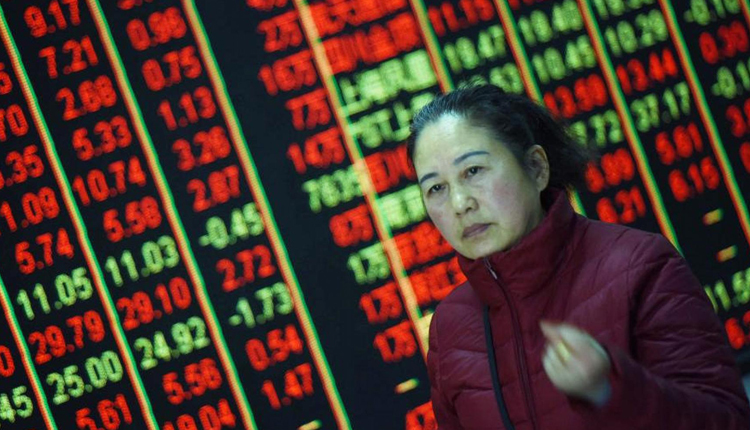Asian markets traded mostly higher on Tuesday, following an overnight bounce on Wall Street, as investors wait for a crucial meeting between President Donald Trump and Chinese leader Xi Jinping.
Japan’s Nikkei 225 rose 0.8 percent, while the Topix index added 0.78 percent. South Korea’s Kospi rose 0.81 percent.
Greater China markets retraced most of their earlier losses: The Taiex, which measures the performance of aggregate listed stocks on the Taiwan stock exchange, traded near flat, after being down 0.7 percent . Hong Kong’s Hang Seng Index erased most of its losses to trade down only 0.09 percent.
Chinese mainland markets stayed positive in the afternoon session, with the Shanghai composite up 0.42 percent and the Shenzhen composite higher by 0.62 percent.
Australia’s benchmark ASX 200 see-sawed between gains and losses before jumping 0.91 percent late in the session. The heavily weighed financial subindex rose 1.31 percent, while the energy sector added 0.93 percent, likely receiving a boost from overnight gains in oil prices.
“Despite data on the whole being softer, global markets traded with a better tone overnight, with equity markets leading the charge,” Nathanael Hartley from ANZ Research wrote in a morning note.
Some analysts said strong Black Friday sales reflecting solid consumer confidence was one of the factors that helped boost risk appetite among investors.
Keeping an eye on Apple suppliers
Investors were closely watching Apple suppliers in Asia throughout the trading day, after Trump suggested that he could place a 10 percent tariff on iPhones and laptops imported from China. Apple products are currently exempt from tariffs.
Shares of Taiwan Semiconductor Manufacturing, which makes chips for iPhones, reversed losses of more than 1 percent to trade up 0.22 percent. Catcher Technology, another Apple partner, erased some of its more than 2 percent losses to trade down 1.82 percent.
IPhone assembler Foxconn, formally known as Hon Hai Precision Industry, traded down 0.7 percent, while Pegatron shares rose 1.18 percent.
Samsung Electronics, which supplies display screens to Apple, rose 0.82 percent.
In an interview with the Wall Street Journal, Trump said it’s “highly unlikely” that he would delay an increase in tariffs from 10 percent to 25 percent on January 1. His comments came days before the G-20 summit in Buenos Aires, Argentina, where he is set to meet Xi for trade talks.
Many investors and decision makers are hoping that the summit will diffuse trade tensions between the U.S. and China after each country applied additional tariffs on billions of dollars’ worth of each other’s imports.
Apple shares fell nearly 2 percent in after-hours trading in the United States.
Trump’s latest remarks “sent a cautious mood to the market as a grim reminder that hurdle remains high in the forthcoming Trump-Xi trade talk,” Huani Zhu, an economist from Mizuho Bank, wrote in a morning note.
Still, one investor told CNBC that the upcoming meeting between the two leaders will be different from previous talks.
“I think the key thing for the G-20 this time, compared for example to the sessions in May, is there seems to be a lot more pre-preparation that’s taken place both on the U.S. side and the China side,” Roger Bacon, head of investments for Asia Pacific at Citi Private Bank, told CNBC’s “Street Signs.”
Bacon explained that markets need to be realistic about the potential outcome from the meeting.
“If we can get at least some semblance of a framework coming out of it for further discussions, then I think the market will take that as positive,” he said.
Crude gains ground on day
On Tuesday afternoon, oil’s upward momentum from Monday stalled. U.S. crude was down 0.33 percent at $51.46 a barrel while Brent fell 0.08 percent to $60.43.
Oil prices had clawed back some of last week’s steep losses and rose nearly 3 percent overnight. Prices fell to their lowest levels in more than a year on Friday amid growing worries of an oversupply in the oil market. OPEC and its allies are set to meet in Vienna next month, and they’re expected to announce that output will be curtailed.
“Investors continue to look ahead to not only the OPEC meeting on 6 December, but the discussion that are likely to had on the sidelines of the G20 summit,” Hartley said.
Still, Saudi Arabia raised oil production to an all-time high in November and pumped around 11.1-11.3 million barrels per day, Reuters reported.
Line and Tencent rise
Elsewhere, the U.S. dollar traded at 97.014 against a basket of its peers. The dollar index was up from levels below 96.60 in the previous week.
The Japanese yen traded at 113.48 to the greenback while the Australian dollar fetched about $0.7227.
In company news, shares of messaging app Line jumped more than 11 percent after the Nikkei business daily reported that it would tie up with Chinese technology giant Tencent to create a mobile payment service.
Line, the Nikkei said without citing sources, will provide mobile payment services to small and medium-sized restaurants and stores in Japan that will be compatible with Tencent’s WeChat Pay, therefore likely targeting Chinese tourists.
Tencent shares rose 1.68 percent in Hong Kong.
Alibaba-backed parenting website operator Babytree Group made its trading debut in Hong Kong. Shares rose as much as 5.1 percent above the firm’s initial public offering price before trimming gains.
Source: CNBC



